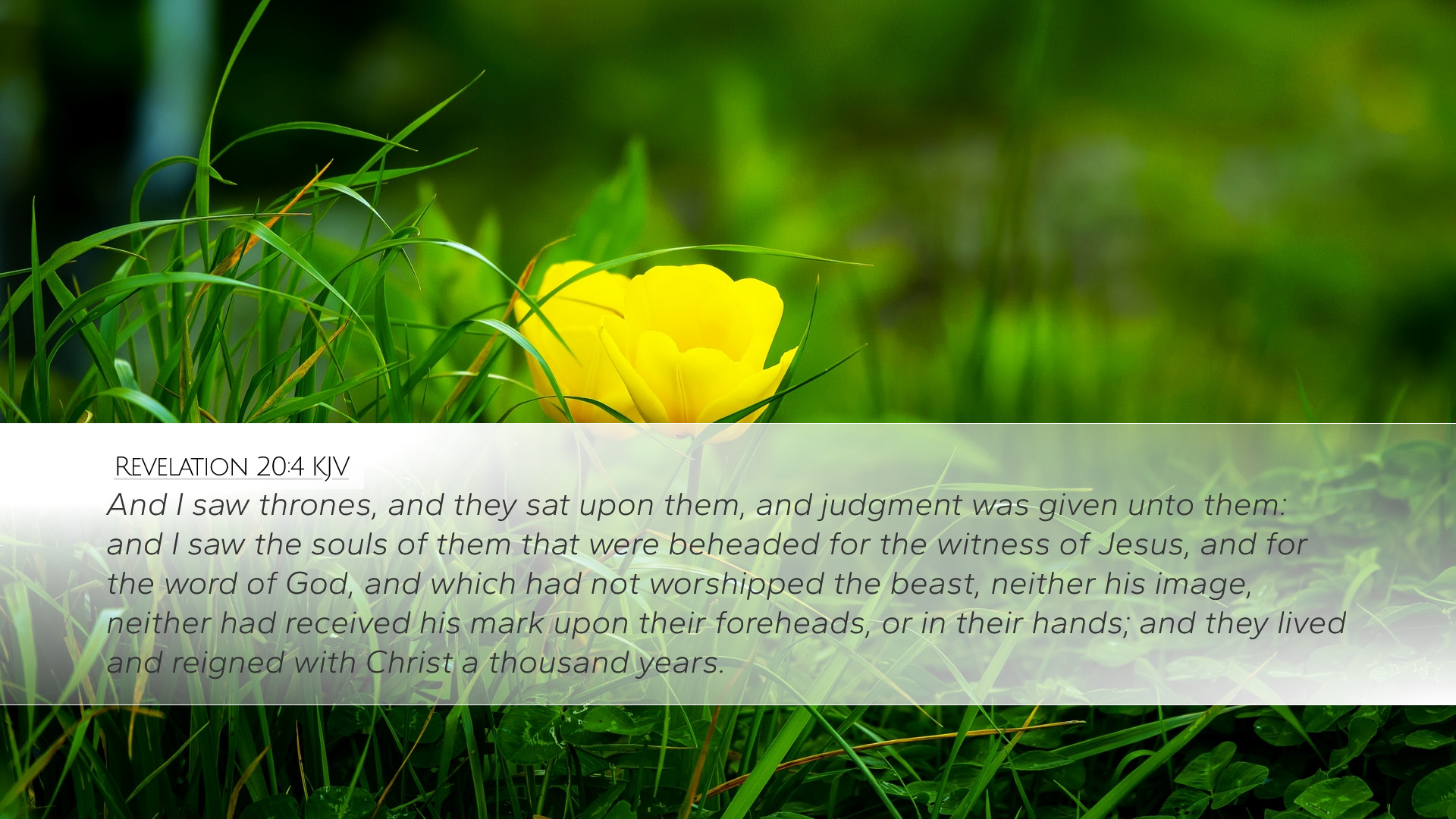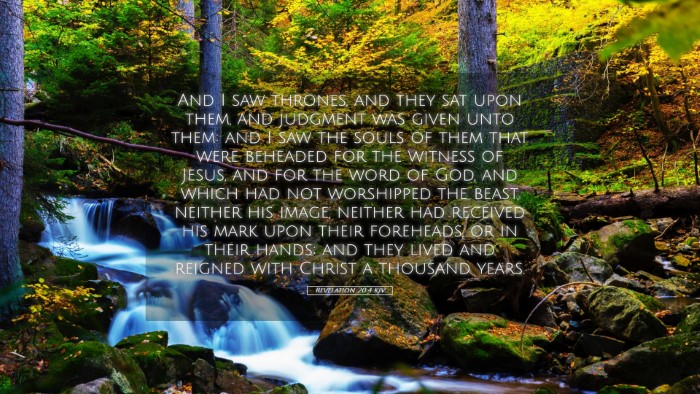Commentary on Revelation 20:4
Verse Text: "And I saw thrones, and they sat upon them, and judgment was given unto them: and I saw the souls of them that were beheaded for the witness of Jesus, and for the word of God, and which had not worshipped the beast, neither his image, neither had received his mark upon their foreheads or in their hands; and they lived and reigned with Christ a thousand years."
Introduction
This verse from Revelation 20:4 presents a profound vision of the final judgment and the reign of Christ with His faithful followers. The imagery of thrones and judgment resonates deeply with the biblical theme of authority and retribution. This commentary will distill insights from public domain sources like Matthew Henry, Albert Barnes, and Adam Clarke to provide a comprehensive understanding of this pivotal text.
The Vision of Thrones
Matthew Henry emphasizes the significance of the thrones in this vision. He notes that the thrones symbolize the authority and the honor bestowed upon the faithful believers who have persevered through trials and tribulations. The act of sitting upon thrones signifies a victorious posture, where the followers of Christ share in the King's rule, echoing the promise given to those who are faithful unto death (Rev. 2:10).
Insight into Judgment
The phrase "judgment was given unto them" indicates a divine assurance that believers will not only witness the judgment but also participate in it. Albert Barnes points out that this reflects the authority given to the saints to judge, based on their faithfulness during their earthly lives. This is an extension of the biblical principle that the meek shall inherit the earth (Matt. 5:5) and suggests a restoration of righteousness in a future kingdom.
The Souls of the Martyrs
The latter portion of this verse focuses on "the souls of them that were beheaded for the witness of Jesus." Adam Clarke elaborates on the harrowing reality of martyrdom, highlighting that these souls represent those who remained steadfast in their testimony for Christ despite facing intense persecution. Clarke notes that the beheading may also serve as a metaphor for the spiritual death of those who succumb to the pressures of the world versus those who maintain their faith.
The Significance of Suffering
Henry reflects on the theme of suffering for Christ, suggesting that such trials are not in vain but rather serve to enhance the glory experienced in the afterlife. The act of enduring persecution for the sake of the gospel is portrayed as a badge of honor, one that ensures a place in Christ’s eternal kingdom, reaffirming the belief that to die for Christ is to gain (Phil. 1:21).
The Refusal to Worship the Beast
This verse also states that the martyrs "had not worshipped the beast." The implication is profound; Barnes notes that these individuals did not compromise their faith even in the face of tremendous pressure to conform to the world’s systems. This highlights a critical teaching within Christian theology about fidelity to God over worldly systems and ideologies.
The Choice of Faithfulness
Clarke reinforces the idea of choice in faithfulness, indicating that the refusal to accept the mark of the beast represents a conscious decision to remain loyal to God, irrespective of societal pressures. The mark represents allegiance, and rejecting it is synonymous with the ultimate allegiance owed to Christ.
The Millennial Reign
The concluding phrase, "and they lived and reigned with Christ a thousand years," introduces the concept of the millennium, a subject of great theological debate. Henry interprets this as a literal reign where Christ's sovereignty is fully manifest. This reign signifies the fulfillment of divine promises where justice and righteousness prevail, offering hope to believers who have experienced suffering.
The Nature of the Millennial Kingdom
Barnes discusses varying interpretations of this period, emphasizing that whether viewed literally or metaphorically, the essence of the passage remains the same: it assures believers of the ultimate victory of Christ over all evil. The reign signals a time of restoration for creation and a culmination of hope for those who have endured persecution.
Conclusion
Revelation 20:4 encapsulates profound truths for Christians regarding suffering, divine justice, and the hope of eternal reward. Through the insights drawn from Henry, Barnes, and Clarke, one can appreciate the depth of meaning behind the imagery of thrones, the honor bestowed upon martyrs, and the promise of reigning with Christ. This verse serves as a powerful reminder that faithfulness to God amidst trials leads to ultimate victory and reign in His eternal kingdom.
Further Reflections
- How does the concept of sharing in Christ's authority shape our understanding of our roles as believers today?
- What practical steps can we take to remain faithful amid societal pressures that challenge our beliefs?
- In what ways can we support those who are suffering for their faith around the world?


